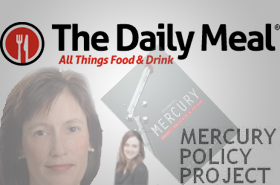The Folly of Giving Time to the Activists
Should We Stop Eating Fish is both the title and the central question that Emily Jacobs asks in a recent article at The Daily Meal. As anyone who has bothered to spend the five seconds it takes to Google Fish Health Benefits can tell you, the answer is a resounding NO. Jacobs herself basically concurs after a long, winding article that chooses to answer at essay length what easily could have been done with a single word.
Nevertheless, along the way Jacobs manages to ignore the overwhelming scientific consensus around the subject, deciding to instead rely on several notorious activists who thrive on muddying the water around the issue and who have spent their professional lives trying to create controversy where none need exist.
The experts consulted by Jacobs include Jane Hightower and the Mercury Policy Project (MPP), both of whom fit the profile of professional environmental activists.
The book Hightower wrote on mercury reads more like a celebrity name-dropping exercise than a serious study. When Hightower does actually get to the science, she relies on outdated anecdotes masquerading as data to try to scare consumers away from fishincluding a more than 40-year-old case in which the U.S. Food and Drug Administration recalled canned tuna from store shelves over mercury concerns. What Hightower doesn’t say is that in the end, less than 23% of the cans tested exceeded the now-obsolete federal mercury limit. Closer to 0% would have exceeded contemporary limit.
The MPP also has a long history of ignoring the basic facts. When they arent busy partnering up with anti-vaccine activists they spend their time rejecting nutrition guidelines from government bodies like the World Health Organization, Food and Agriculture Organization, Food and Drug Administration, and United States Department of Agriculture, all of which urge greater fish consumption . MPP has also disparaged peer-reviewed scientific findings from institutions such as the Harvard School of Public Health and the Institute of Medicine proving that the benefits of eating seafood far outweigh the risks.
Treating activists like Hightower and the MPP as supposed experts is a menace to public health. The science is clear: eating fish is a vital part of a healthy diet. And allowing activists to stir up a debate they have already lost can only promote harmful health outcomes. Jacobs, and others writing on the subject, owe it to their readers to promote sound science, not the musings of activists looking to make a quick splash in the papers.



